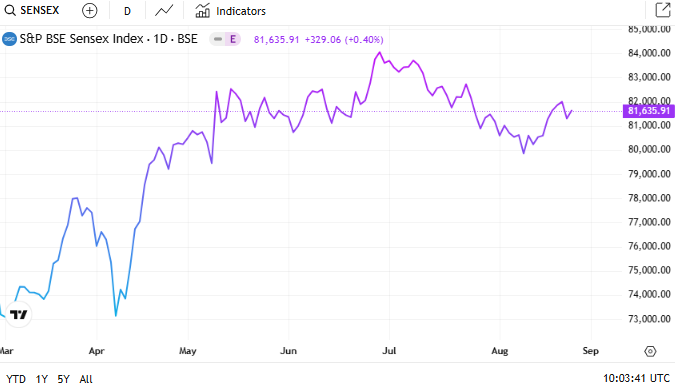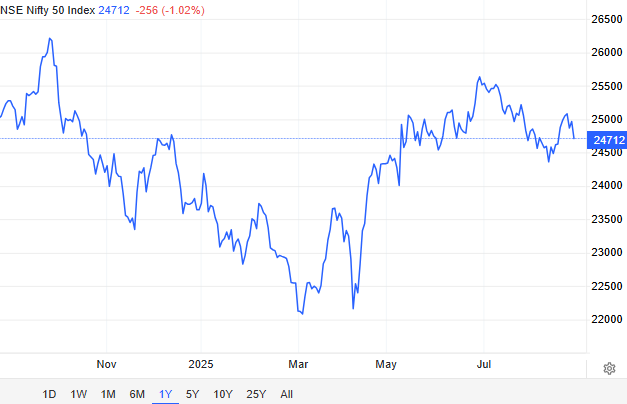Why Sensex Drops Sharply Today — Over 600 Points Lost as Nifty Slips Under 24,800
The Indian stock market faced heavy selling pressure today as the Sensex dropped sharply by more than 600 points, while the Nifty slipped below the 24,800 mark. The fall was driven by weak global cues, profit booking in heavyweight stocks, and investor caution ahead of key economic data.
Market participants remained on edge, with concerns about inflation, foreign fund outflows, and global uncertainty weighing heavily on sentiment.
Sensex Drops Sharply Amid Global Weakness
The Sensex, which represents the 30 largest companies on the Bombay Stock Exchange, opened on a weak note and continued its downward slide. Selling pressure was seen across sectors, with banking, IT, and auto stocks leading the losses. The market correction comes after a period of strong gains, as investors decided to lock in profits amid global headwinds.
International markets also painted a grim picture. Asian indices remained under pressure due to renewed concerns about US interest rates and slowing demand in China. European futures signaled a muted start, adding further weight to the bearish sentiment in Indian equities.

Nifty Slips Below 24,800: Why It Matters
The Nifty (NFTY: NASDAQ) 50 index, a broader measure of the market, slipped under the 24,800 mark, signaling caution among investors. This level is considered a key psychological support. A break below it indicates that traders are hesitant to take fresh positions, especially with upcoming macroeconomic data and global policy updates.
Market experts believe that volatility could remain high in the near term. Investors are closely tracking the movement of the US dollar, crude oil prices, and bond yields, which continue to play a significant role in shaping foreign investment flows into Indian equities.

Foreign Institutional Investors and Profit Booking
A major reason behind today’s market decline is the sustained selling by foreign institutional investors (FIIs). Over the past sessions, FIIs have been net sellers, pulling money out of Indian equities and adding to the weakness. Rising US bond yields and uncertainty about the Federal Reserve’s rate outlook are making global investors cautious.
On the domestic front, retail investors and mutual funds have continued to provide some support, but heavy FII selling has outweighed the positive flows. Profit booking in banking stocks, IT majors, and auto shares contributed significantly to today’s correction.
Sector-Wise Performance: Banking and IT Under Pressure
The decline was broad-based, but banking and IT stocks suffered the most. Major private sector banks saw sharp cuts, while IT giants also faced selling due to global tech weakness.
The auto sector, which had seen strong momentum in the past few weeks, also witnessed profit booking. On the other hand, a few defensive sectors like FMCG and pharma managed to limit losses, as investors shifted toward safer bets amid volatility.
The correction highlights the fragile investor mood, where global uncertainties quickly translate into domestic weakness.
Impact of Global Markets on Indian Equities
The Indian stock market is closely tied to global developments. Today’s weakness reflects fears around the global economy, particularly concerns over inflation in developed markets and slowing growth in Asia.
Rising US bond yields and speculation about further Federal Reserve tightening continue to put pressure on emerging market equities. Investors are also tracking China’s economic data, as weaker-than-expected growth there impacts global supply chains and commodity demand.
Additionally, geopolitical concerns and fluctuating crude oil prices have raised worries about India’s import bill, keeping the market cautious.
AI Stocks and Market Research Opportunities
While today’s decline has dented sentiment, analysts believe that long-term opportunities remain strong in sectors like AI stocks, renewable energy, and infrastructure. Investors focusing on stock research and sector-specific strategies may find value in this correction.
AI-driven companies in IT and digital transformation continue to attract attention despite short-term volatility. Investors are advised to track fundamentals and not be swayed by daily fluctuations, as long-term growth stories remain intact in India’s expanding economy.
Investor Sentiment: What to Expect Ahead
The coming weeks will be crucial for the Indian stock market. Investors are awaiting domestic inflation data, the Reserve Bank of India’s monetary policy outlook, and global updates from the US Federal Reserve.
If inflation remains under control and corporate earnings continue to show resilience, markets may recover from this correction. However, if global cues remain negative, volatility is likely to persist.
Market experts suggest that investors adopt a cautious approach, focus on quality stocks, and use the current weakness as an opportunity to build long-term portfolios.
Conclusion
The Sensex drop of over 600 points and the Nifty slipping below 24,800 highlight the fragile balance between optimism and caution in the Indian stock market. While global headwinds and FII outflows triggered today’s correction, the long-term growth story of India remains strong.
Investors with a disciplined approach, strong research, and a focus on fundamentals can navigate the current volatility and position themselves for future gains.
FAQs
The Sensex dropped due to weak global cues, profit booking in banking and IT stocks, and sustained selling by foreign institutional investors.
Experts believe this is a short-term correction driven by global factors. The long-term outlook for Indian equities remains positive.
Investors should focus on strong fundamentals, conduct proper stock research, and consider accumulating quality stocks in sectors like AI, FMCG, and renewable energy during dips.
Disclaimer:
This content is made for learning only. It is not meant to give financial advice. Always check the facts yourself. Financial decisions need detailed research.






